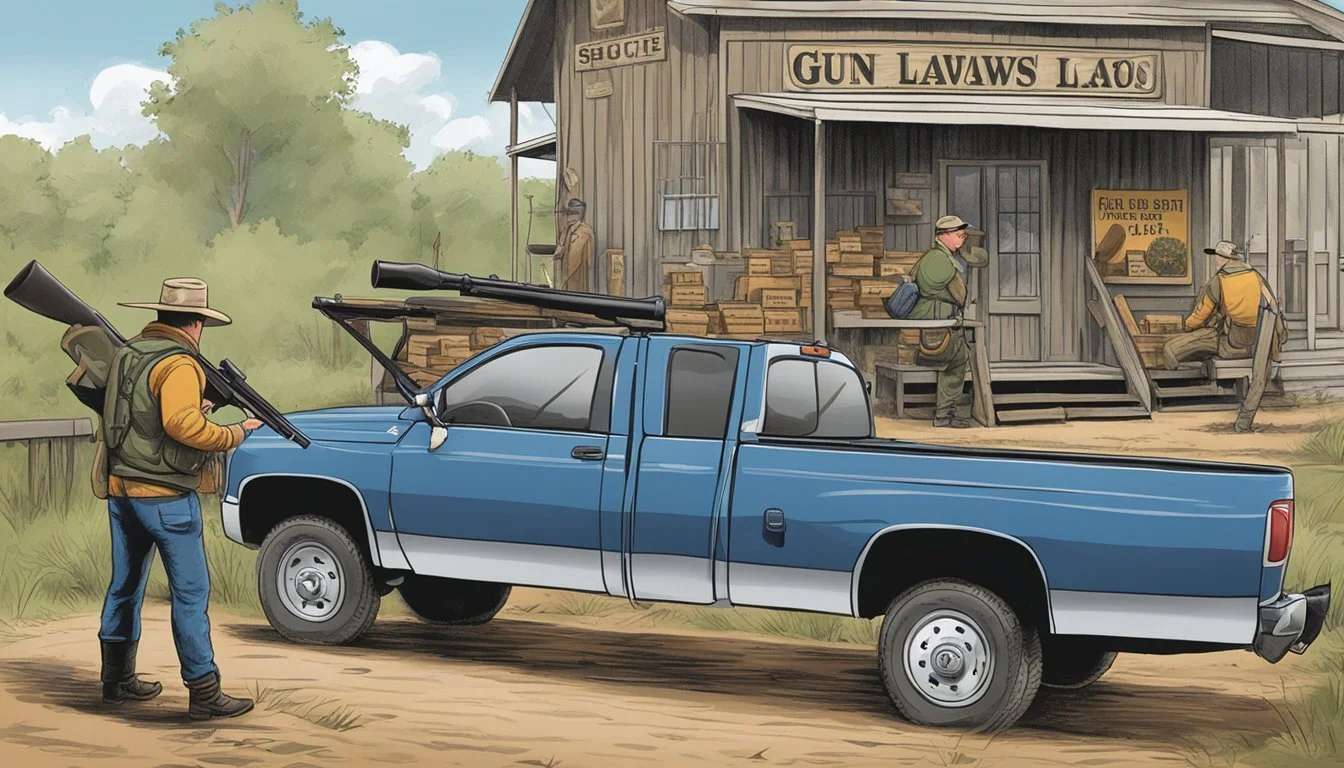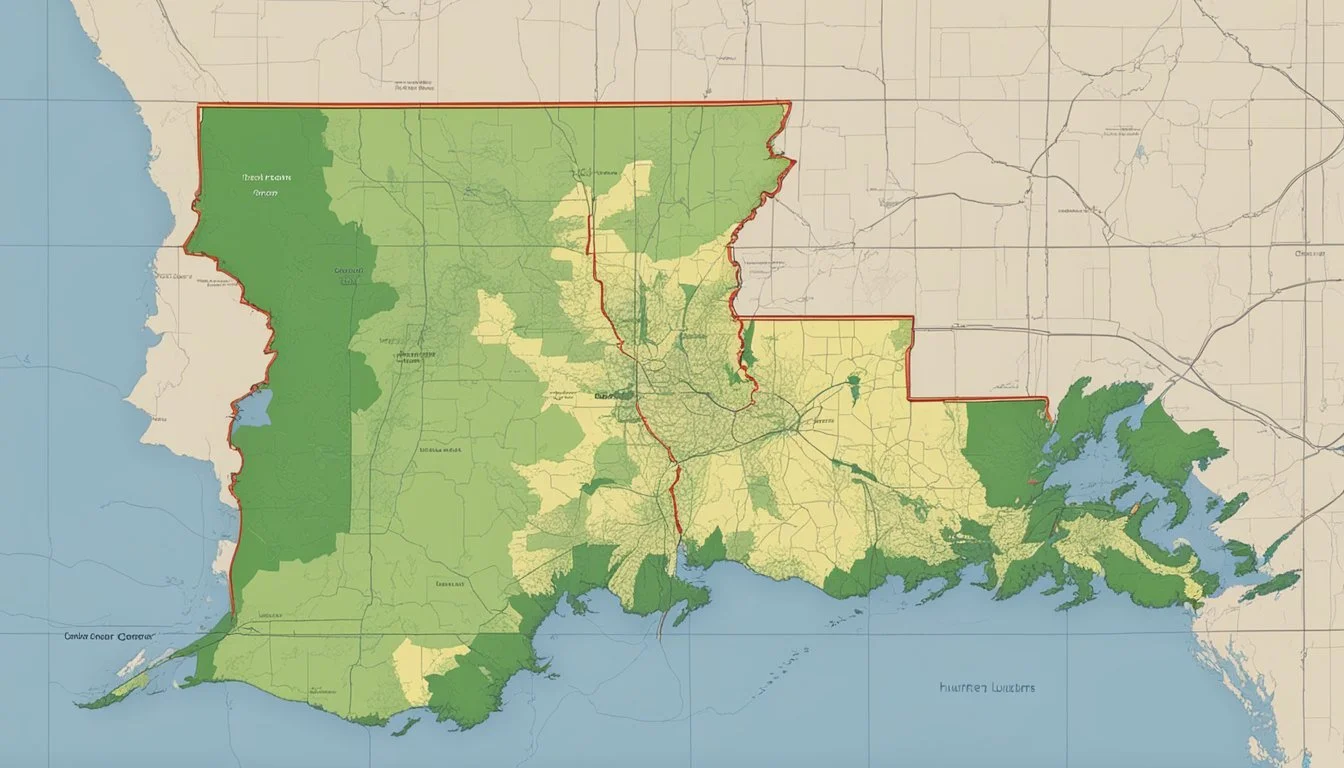Gun Laws in Louisiana for Hunters
Regulations and Requirements for the Hunting Season
Louisiana offers a unique tapestry of landscapes that entice hunters each season. The state's gun laws are critical for those participating in hunting activities, as they define the legal framework for the purchase, possession, and use of firearms. Hunters must navigate both state and federal laws to ensure compliance while engaging in their sport.
State laws in Louisiana are specific about the use of firearms during hunting. For example, hunters are required to wear blaze orange during certain seasons for safety, and there are regulations on the types of firearms and ammunition that can be used. Furthermore, carrying a firearm while impaired by alcohol or drugs is illegal in Louisiana. It's also worth noting that certain areas are designated as off-limits for carrying firearms.
For concealed carry during hunting, Louisiana requires individuals to have the appropriate permits. Staying informed about these regulations helps ensure a safe and lawful hunting experience. As legislation can change, it is important for hunters to remain updated on the latest laws and requirements each hunting season to avoid any legal infractions and to protect the safety of themselves and others in the hunting community.
Legal Requirements for Gun Ownership
In Louisiana, hunters need to understand the essential legal requirements for gun ownership which encompass background checks, possession of proper identification, completion of firearm safety training, and hunter education courses.
Background Checks and Identification
Louisiana law mandates that purchasers of firearms from licensed dealers undergo a background check as per federal law. When buying from a private individual, however, no background check is required. Hunters must present valid identification to complete the purchase from a licensed dealer.
Background Checks: Required by licensed dealers; not required for private sales
Identification: Valid government-issued ID necessary
Firearm Safety and Training
While not mandated by state law, firearm safety and training are critical for hunters in Louisiana. Knowledgeable gun handlers are less likely to be involved in firearm accidents, and also, such training is often necessary to familiarize one's self with the ethical and legal aspects of hunting.
Firearm Safety: Highly recommended for all gun owners
Training: Beneficial for skill and safety enhancement
Hunter Education Courses
Louisiana requires that all hunters born on or after September 1, 1969, must complete a hunter education course before obtaining a hunting license. This course can be taken online or in-person and includes training on various aspects of hunting safety, wildlife conservation, and hunting laws.
Completion required for hunters born on or after September 1, 1969
Provides comprehensive education on hunting safety and ethics
Types of Firearms and Ammunition
In Louisiana, hunters are subject to specific guidelines regarding the firearms and ammunition they can use. These standards ensure both safety and compliance with state regulations.
Handgun Specifications
In Louisiana, handguns are defined as short-barreled firearms designed to be fired with one hand. While Louisiana statutes do not detail the specifics of antique and replica firearms, they are generally treated as regular firearms for possession and carrying purposes. Hunters typically do not use handguns as their primary weapon, but may carry them for personal protection in the field.
Rifle and Shotgun Use
Hunters in Louisiana commonly use rifles and shotguns for various game. Rifles offer long-range accuracy, making them suitable for deer hunting, while shotguns are preferred for bird hunting due to their spread shot pattern. It's essential for hunters to choose the appropriate caliber or gauge for the game they are pursuing to ensure humane hunting practices.
Ammunition Regulations
Louisiana has strict regulations when it comes to ammunition. For instance, it is illegal to provide ammunition to anyone known to be prohibited by Louisiana law from possessing a firearm due to a felony conviction. Hunters must use legally obtained ammunition that is suitable for their specific firearm and the game they are targeting. This ensures both safety and legal compliance.
Carrying Firearms in Louisiana
In Louisiana, hunters carrying firearms must adhere to state guidelines, which differentiate between open and concealed carry, and specify regulations concerning carrying firearms in vehicles.
Open Carry Guidelines
Louisiana law permits open carry of firearms without the need for a permit, provided the individual is of legal age and not prohibited from possessing a firearm. Individuals are allowed to carry openly in most public places, but certain restrictions apply to places like schools, government buildings, and private property where owners have prohibited firearms.
Concealed Carry Permits
To carry a concealed firearm in Louisiana, individuals must obtain a concealed carry permit from the Louisiana State Police. Applicants must be at least 21 years old, complete a firearms training course, and undergo a background check. As of July 4, 2024, Louisiana will allow constitutional carry, enabling non-felons to carry a concealed firearm without a permit, though state restrictions on concealed carry in specific locations will remain.
Vehicle Transportation
Louisiana allows an individual to transport a firearm in their vehicle without a permit. The firearm may be stored openly or concealed in the vehicle. However, when carrying a firearm in a vehicle, one must abide by both state and federal transportation laws, especially when traveling across state lines or into areas where firearm possession is restricted or prohibited.
Hunting Regulations
In Louisiana, hunting is a regulated activity to ensure safety, conservation, and sustainable game populations. Heed the state requirements for hunter orange, understand wildlife management efforts, and always carry the necessary hunting licenses and permits.
Hunter Orange Requirements
Under Louisiana law, hunters are required to wear a minimum of 400 square inches of hunter orange material. This must include a head covering visible from all sides. The absence of hunter orange is a common cause of hunting incidents, making this requirement critical for hunter safety during firearms seasons.
Wildlife Management
The state of Louisiana implements wildlife management to sustain and improve game species' habitats and populations. Hunting Seasons are established to coincide with times when game species populations can support hunting without endangering their numbers. Hunters must adhere to bag limits and hunting zone restrictions to assist in these conservation efforts.
Hunting Licenses and Permits
Hunters in Louisiana must obtain the appropriate hunting license and any required permits or stamps for the game they are pursuing.
Resident and Non-Resident Licenses: Options vary and can include annual or short-term licenses.
Permits and Stamps: Some activities, like hunting waterfowl, require additional federal stamps.
Hunter Education: Required for hunters born after September 1, 1969.
Licensing Process: Always refer to the Louisiana Department of Wildlife and Fisheries for the most recent process and fee information.
Hunters should ensure they are familiar with the distinct regulations that pertain to different game species and hunting areas, as these rules are in place to promote legal and ethical hunting practices across the state.
Sale and Transfer of Firearms
In Louisiana, the processes for selling and transferring firearms involve regulations that vary depending on the type of seller and buyer involved. These include specific responsibilities for dealers and different rules for private sales.
Dealer Requirements
Dealers in Louisiana must comply with both federal and state regulations for firearm transactions. They are responsible for conducting background checks through the National Instant Criminal Background Check System (NICS) for every sale. Additionally, they must record each transaction and keep these records for inspection by law enforcement agencies.
Background checks: Mandatory for all dealer firearm transactions
Recordkeeping: Dealers must document sales as required by law
Private Sale Regulations
Private firearms sales in Louisiana are not subjected to the same level of oversight as those conducted by licensed dealers. While no background check is required for a private sale, state law prohibits the transfer of firearms to individuals known to be prohibited from possessing guns.
Background check: Not required for private sales
Prohibited persons: Illegal to sell to individuals known to be prohibited from owning firearms
Import and Trade Associations
Firearm imports into Louisiana must adhere to federal importation laws and regulations. Trade associations often provide guidance and support for dealers and importers, ensuring compliance with legal requirements. They play an essential role in educating their members about both import regulations and responsible trade practices.
Federal Import Regulations: Compliance required for all firearms brought into the state
Trade Association Role: Offer assistance and information about legal sales and importation practices
Prohibited Areas and Individuals
In Louisiana, specific regulations are in place to ensure the safety of the community by designating areas where firearms are not allowed and identifying individuals who are prohibited from gun possession.
Alcohol-Related Restrictions
Louisiana law prohibits possession of firearms in establishments where alcoholic beverages are the primary commodity for sale. This restriction applies to places like bars. Hunters should be mindful that consumption of alcohol while in possession of a firearm is also prohibited.
Locations with Enhanced Security
Certain locations in Louisiana have increased security measures, which include restrictions on carrying firearms:
Prisons and Jails prohibit firearms to prevent potential security breaches.
Courthouses have a strict no-firearm policy due to the sensitive nature of legal proceedings.
Polling Places during election times are firearm-free zones to ensure a safe voting environment.
Places of Worship may prohibit firearms, although they can allow them with permission from the leadership.
It is illegal to carry firearms in areas designated as firearm-free zones, which are clearly marked with signs.
Parades that have obtained a permit are also included in areas where firearms are prohibited.
Prohibited Individuals
Louisiana, following federal standards, dictates who may not possess firearms:
Individuals convicted of a felony are barred from gun possession.
Those convicted of certain domestic violence misdemeanors.
Individuals under specific court orders related to domestic violence or a serious mental condition.
For hunter safety, persons without a Hunter Education Certification (born on or after Sep 1, 1969) may not hunt and thus cannot possess hunting firearms.
The state emphasizes responsible firearm handling and compliance with these laws to prevent incidents of violence and maintain public safety.
Law Enforcement Interactions
When hunters in Louisiana have interactions with law enforcement officers, there are specific protocols concerning pat downs and chemical tests, as well as reporting requirements that must be adhered to for everyone's safety and legal compliance.
Pat Down and Chemical Tests
Law enforcement officers in Louisiana have the right to conduct a pat down if they suspect a person is carrying a weapon or if a safety concern arises. During a hunt, if an officer has a reasonable suspicion that an individual may be involved in criminal activity or poses a threat, a pat down may be conducted for weapons. It is important for hunters to comply calmly and follow the officer's instructions.
Chemical Test: In cases where a law enforcement officer suspects impairment, a hunter may be subjected to a chemical test. While blood alcohol content regulations may be specifically enforced on the road, impairment in the field can also be a legal issue, and refusal to comply with a chemical test can result in penalties.
Reporting to Officers
When approached by a police officer or peace officer, hunters are typically required to provide certain information:
Identifying Information: Full name, hunting license details, and sometimes identification proof.
Response to Inquiry: Details about the hunting activity, including location, time, and nature of the game being hunted.
Hunters should report any incidents or observations of illegal activity to the officers as well, as they play a critical role in conservation and law enforcement efforts. It is essential to be clear and truthful in all interactions with law enforcement to maintain the integrity of the hunting experience in Louisiana.
Departmental and Legal Authority
In Louisiana, the enforcement and regulation of hunting and firearm laws are under the jurisdiction of specific state departments. They ensure public safety and the preservation of wildlife.
Louisiana Department of Wildlife and Fisheries
The Louisiana Department of Wildlife and Fisheries (LDWF) plays a pivotal role in managing and protecting the state's natural resources. It is responsible for issuing hunting licenses and overseeing hunting regulations. The LDWF ensures that hunters comply with firearm guidelines which include the allowable types of firearms and ammunition for hunting, as well as bag limits and hunting seasons.
Key Responsibilities:
Issuance of Licenses: Hunting, fishing, and trapping permits
Regulation Compliance: Enforcing hunting laws and firearm regulations
Education: Providing safety courses for hunters
Public Safety and Corrections
The Department of Public Safety and Corrections oversees public safety services in Louisiana. It includes the Office of the Deputy Secretary. Their duties stretch beyond correctional facilities to include the regulation of firearm possession and carrying.
Public Safety Services:
Background Checks: Conducted for firearm purchases
Weapon Restrictions: Enforcement of laws against carrying concealed weapons by persons including those convicted of domestic abuse battery
The department also certifies peace officers, who are crucial in the enforcement of state laws including those regarding illegal possession and carrying of firearms by juveniles.
Specific Hunting Scenarios
Louisiana offers diverse hunting scenarios, each with its own set of rules to ensure safety and sustainability. It is citical for hunters to familiarize themselves with these regulations before participating in various seasonal hunts.
Deer and Turkey Season
During deer season, hunters targeting white-tailed deer are required to wear a minimum of 400 square inches of hunter orange or blaze pink. This requirement applies to the head, chest, and back areas to increase visibility for hunting safety. For turkey hunting, the regulations stipulate hunters must also adhere to visibility standards, though specific requirements may vary.
Deer Hunting
Clothing: At least 400 square inches of visible hunter orange or blaze pink.
Safety: Visibility is key for preventing accidents.
Turkey Hunting
Seasons: Defined dates for both fall and spring seasons.
Harvest Limits: Strict bag limits to promote sustainable hunting.
Duck Hunting Regulations
Duck (What wine goes well with duck?) hunting adheres to specific gear restrictions to maintain local populations and habitat health. The shotgun used should not be capable of holding more than three shells and must be plugged accordingly unless on private land.
Shotgun Restrictions: Cannot exceed a three-shell capacity.
Licensing: Required for both in-state and out-of-state hunters.
Youth Hunting Considerations
Louisiana encourages youth hunting to instill responsible practices early on. Special regulations and seasons are often established to provide youth hunters with opportunities that emphasize safety and proper hunting techniques.
Youth Hunts
Special Seasons: Often set aside for youth only.
Education: Youth hunters must complete Hunter Education courses.
Safety First
Adult Supervision: Typically required for hunters under a certain age.
Hunter Education: They must complete a course if born after September 1, 1969.
Penalties and Legal Repercussions
Louisiana enforces stringent penalties for hunting-related firearms violations, which can range from fees to more severe legal repercussions.
Violations and Fines
Violators in Louisiana who do not adhere to gun laws during hunting activities may face various fines. For instance, carrying a firearm while impaired exceeds a blood alcohol reading of 0.05 and is considered unlawful. If caught, one may be fined, with amounts varying based on the severity of the offense. Fines act as a deterrent against gun violence and ensure adherence to the state ordinances.
License Suspension and Revocation
In cases of more serious or repeated offenses, individuals may face license suspension or revocation. A misdemeanor related to illegal hunting practices or firearms misuse can lead to these severe consequences. Louisiana's Department of Wildlife and Fisheries (LDWF) has the authority to suspend or revoke hunting licenses, thereby prohibiting the offender from participating in hunting activities for a period determined by the violation's severity. License suspension serves not only as a punitive measure but also as a preventive action against potential gun violence and hunting violations.
Additional Considerations for Gun Owners
For hunters in Louisiana, understanding the nuances of gun laws extends beyond simple possession and carrying rules. This section addresses specific elements of firearms design and usage, as well as considerations for carrying on private property and in businesses.
Gun Design and Accessories
When selecting firearms and accessories, gun owners should prioritize safety features such as trigger guards that prevent accidental discharge. Louisiana law does not specify regulations regarding the design and manufacture of firearms; however, safety should always be a gun owner's paramount concern. Accessories that alter a loaded firearm in a manner that might be deemed unsafe or alter its intended use could also have legal implications.
Property and Business Concerns
Gun owners in Louisiana must respect property rights and be aware of individual business policies regarding firearms. It is legal to carry firearms onto private property unless the property owner explicitly prohibits it. For businesses, gun owners should look for posted signage that either permits or bans firearms on the premises. Carrying a loaded firearm into a business that has banned them could result in legal penalties.
Businesses: Must post clear signage regarding firearms policy.
Property owners: Can ban firearms from their property.
Gun owners: Must comply with posted signs and property owner requests.










